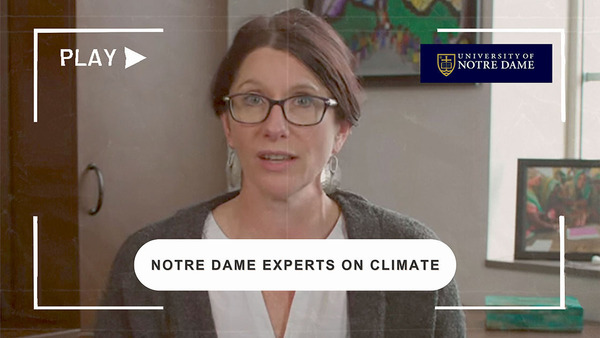The first week of the COP28 climate summit in Dubai saw significant announcements from countries aiming to take action on climate change. But the conference, which is set to end on Dec. 12, is just a start.
William J. Pulte Director Tracy Kijewski-Correa and Pulte Institute Core Affiliated Faculty Emily Grubert, Daniel C. Miller, and Paul Winters recently spoke about their research and how they are partnering with communities worldwide to mitigate climate change. As these professors explain, the urgency of their work becomes more evident every day as global warming exacerbates existing barriers to opportunities among the most vulnerable.
"So much of our discussion has been focused on mitigation. How do we stop the drivers of a changing climate? Unfortunately, in the world that I work in, with disasters on our coastlines and floods, wildfires, and other phenomena, we can now see that the climate has changed to the point that it can no longer be ignored. A dual commitment to mitigation and present-day adaptation will be critical to survive a transition on both fronts — transitions away from fossil fuels and living in a more climate-demanding reality.
Adaptation in the context of groundwater means fundamentally rethinking how we share water resources across communities, countries, international boundaries, and the world. Many legal frameworks that govern this were designed and arose when they wanted to incentivize people to move to certain areas. Now, we have large populations drawing on limited resources, and we need to fundamentally rethink how those resources are shared."
— Tracy Kijewski-Correa, William J. Pulte Director, i-Lab Academic Director, and Professor of Engineering and Global Affairs
"I'm a civil engineer and an environmental sociologist, so I think a lot about what people need as we transition. One of the critical things under adaptation is safe housing, or having housing that is really up to par for what we need under the climate challenge that can keep people warm in the winter and cool in the summer. It is a critical infrastructural choice we can make now and enact worldwide."
— Emily Grubert, Pulte Institute Core Affiliated Faculty and Associate Professor of Sustainable Energy Policy at the Keough School
"Indigenous peoples and local communities effectively control, manage, or govern about a third of the world's forests. However, these lands require resources, and our research shows that these resources, to date, are woefully inadequate. Forest land and communities are critical to addressing climate change and helping marginalized and vulnerable communities adapt to its worst effects."
— Daniel C. Miller, Pulte Institute Core Affiliated Faculty, Coordinator of the FLARE network, Director of the Keough School's Sustainable Development Concentration, and Associate Professor of Environmental Policy
"In terms of climate change, food security, and agriculture success means that we address climate change while maintaining the livelihoods and well-being of farmers worldwide. Governments must lead, and the private sector and civil society must respond to climate change issues. It means using innovations that can address climate change and get us out of the dilemma of ensuring that we can produce enough food in the world while figuring out the well-being of farmers."
